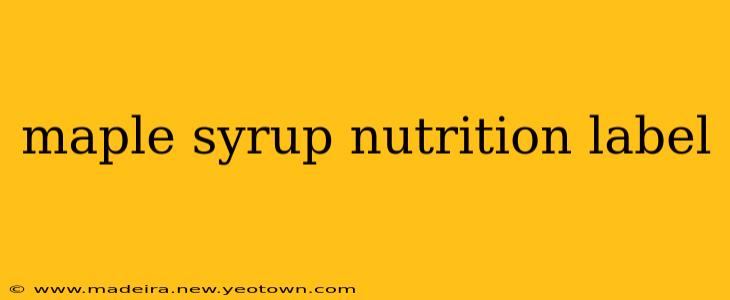Maple syrup, that golden elixir drizzled over pancakes or used to sweeten your morning coffee, holds more than just delightful taste. It's a natural sweetener with a unique nutritional profile that deserves a closer look. Let's delve into the details of a typical maple syrup nutrition label, uncovering its secrets and answering some common questions.
Imagine yourself in a cozy Vermont cabin, the scent of freshly baked waffles mingling with the sweet aroma of maple syrup. You reach for the bottle, its amber liquid promising a delightful treat. But beyond the taste, what's truly inside? That's what we'll explore.
What are the key nutrients in maple syrup?
A typical nutrition label will show maple syrup as a source of carbohydrates, primarily in the form of sugars (sucrose, glucose, and fructose). While it doesn't boast high levels of vitamins or minerals like some fruits and vegetables, it offers small amounts of manganese and zinc, essential minerals vital for various bodily functions. The exact amounts can vary depending on the grade and source of the maple syrup. Think of it as a natural, albeit concentrated, source of carbohydrates with a few beneficial trace minerals added in.
Is maple syrup healthier than sugar?
This is a question that often sparks debate. While maple syrup is a natural sweetener, it's still high in sugar. Therefore, it's not inherently "healthier" than refined sugar, as both significantly impact blood sugar levels. However, some argue that the presence of antioxidants and trace minerals in maple syrup might offer slight advantages over refined sugar, though more research is needed to solidify these claims. Moderation is key with both.
How many calories are in maple syrup?
A typical serving (around 1 tablespoon) of maple syrup contains approximately 52 calories. The calorie count primarily stems from the carbohydrate content. Be mindful of your portion sizes, as the calories can add up quickly if you're using it liberally.
What are the different grades of maple syrup, and do they differ nutritionally?
Maple syrup is graded according to its color and flavor, ranging from Golden Color (delicate taste) to Very Dark Color (robust taste). While the nutritional differences between grades are generally minor, the darker grades may contain slightly higher levels of antioxidants due to longer boiling times and increased concentration of compounds.
Does maple syrup have any health benefits?
While not a miracle cure, some studies suggest potential health benefits associated with maple syrup consumption. These include antioxidant properties attributed to certain compounds present in the syrup, potentially offering protection against cell damage. However, it's crucial to remember that these potential benefits are linked to moderate consumption and should not overshadow the fact that it remains a concentrated source of sugar.
Is maple syrup suitable for people with diabetes?
Due to its high sugar content, maple syrup should be consumed cautiously by individuals with diabetes. It can significantly impact blood sugar levels, requiring careful monitoring and adjustment of medication or insulin dosages. Consulting with a healthcare professional or registered dietitian is crucial before incorporating maple syrup into a diabetic diet.
Can I use maple syrup as a sugar substitute?
While maple syrup can replace refined sugar in some recipes, it's important to remember that it’s sweeter and denser than granulated sugar. You might need to adjust recipes accordingly. Substituting one-for-one might result in an overly sweet or dense final product.
In conclusion, maple syrup is a delicious and natural sweetener, adding a touch of sweetness and a unique flavor to various dishes. However, mindful consumption is crucial, balancing its delightful taste with its concentrated sugar content. Remember, moderation is key to enjoying the sweet rewards of this natural treasure without compromising your health.

